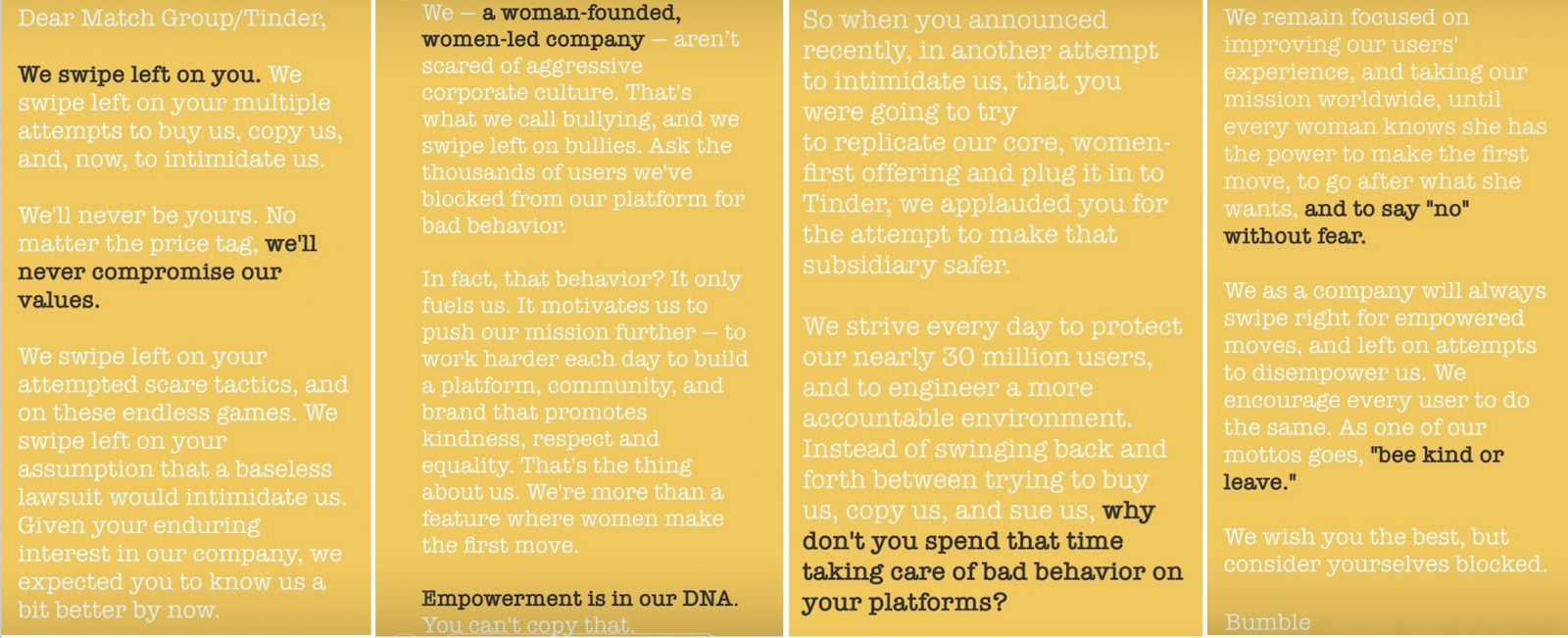
image: Bumble
Companies run the very real risk of becoming ensnared in a mess of unflattering press each time they decide to initiate litigation, something that could have significant tangible effects on consumers’ perceptions of a brand and on the stock price when it comes to publically-traded entities. This fact is something that Bumble reminded everyone of on Tuesday, when the dating app responded to the strongly-worded lawsuit filed against it by rival Tinder’s parent company Match, which alleged that Bumble is little more than a “virtually identical” copy of Tinder’s “world-changing” app.
In a complaint filed in federal court in Texas late last week, Match makes claims of nearly every form of intellectual property infringement available in the U.S. – from trademark infringement and dilution, trade dress infringement, trade secret misappropriation, and unfair competition to utility and design patent infringement, against Bumble. Match goes as far as to claim that a significant portion of its features have been recreated by Bumble, in the latter’s quest “to mimic Tinder’s functionality, trade off of Tinder’s name, brand, and general look and feel, meet user expectations that Tinder itself and its brand created, and build a business entirely on a Tinder-clone, distinguished only by Bumble’s women-talk-first marketing strategy.”

Bumble was able to re-create its Tinder app so perfectly, according to Match’s complaint, because a number of former Tinder execs – who “were given access to certain confidential information related to proposed Tinder features” – allegedly took that info with them when they jumped ship to launch Bumble in December 2014 with Tinder co-founder Whitney Wolfe Herd.
Not to be outdone, Bumble responded on Tuesday via Instagram. In four posts – as well as full page ads in The New York Times and Dallas Morning News – that do not explicitly address the legal claims at hand, but that make quite a statement, nonetheless, Bumble slams Match/Tinder’s “attempts to intimidate” the “woman-founded, women-led company,” pointing to the companies’ allegedly “aggressive corporate culture” and calling their tactics “bullying.”
Texas-based Bumble goes on to note its efforts to “empower” and “protect [its] nearly 30 million users, and to engineer a more accountable environment,” suggesting that instead of suing Bumble, Match/Tinder should “spend that time taking care of bad behavior on your platforms.”
The lawsuit against Bumble, which was valued at at more than $1 billion in late 2017, is particularly noteworthy given the complicated backstory between Bumble and its founder, and Match/Tinder, including the fact that just three months before she launched Bumble, Wolfe Herd was able to come to a settlement with Tinder in connection with the sexual discrimination and harassment lawsuit she filed after allegedly experiencing widespread mistreatment while employed by Tinder.
Still yet, the parties are said to have been in discussion for Match to acquire Bumble, with Axios suggesting that the lawsuit at hand might be a way for Match to restart the stalled negotiations in which the parties were engaged after Match offered to buy Bumble for $450 million last summer. Bumble “swiped left” on that offer.
In something of a (potentially) mind-blowingly powerful public relations move, Bumble has managed to shift the narrative of the lawsuit, and in theory, market its app in light of what might otherwise be considered downright damming claims of copying and rampant “infringement” – all in just for Instagram Stories posts.
Bumble has not yet formally responded to Match’s lawsuit, i.e., in court, but stay tuned …











